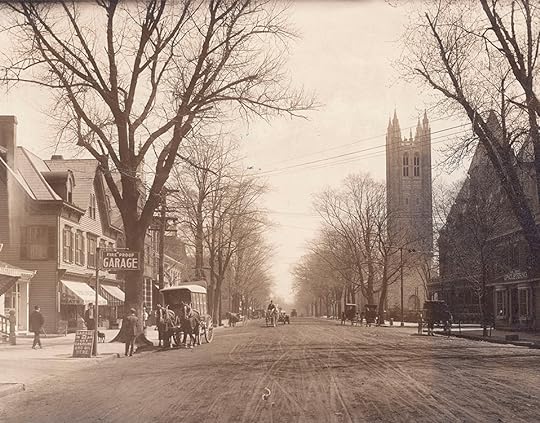What do you think?
Rate this book


275 pages, Paperback
First published March 26, 1920
"I sent my son to Princeton…Perhaps you knew him. His name was Jesse Ferrenby. He was killed last year in France.”
“I knew him very well. In fact, he was one of my particular friends.”
“He was – a – quite a fine boy. We were very close.”
Amory began to perceive a resemblance between the father and the dead son and he told himself that there had been all along a sense of familiarity. Jesse Ferrenby, the man who in college had borne off the crown that he had aspired to. It was all so far away. What little boys they had been, working for blue ribbons…The big man held out his hand. Amory saw that the fact that he had known Jesse more than outweighed any disfavor he had created by his opinions. What ghosts were people with which to work!
"I detest poor people,” thought Amory suddenly. “I hate them for being poor. Poverty may have been beautiful once, but it’s rotten now. It’s the ugliest thing in the world. It’s essentially cleaner to be corrupt and rich than it is to be innocent and poor.”
At first Amory noticed only the wealth of sunshine creeping across the long, green swards, dancing on the leaded windowpanes, and swimming around the tops of the spires and towers and battlemented walls…





“Amory, you’re young. I’m young. People excuse us now for our poses and vanities, for treating people like Sancho and yet getting away with it. They excuse us now. But you’ve got a lot of knocks coming to you.”
Long after midnight the towers and spires of Princeton were visible, with here and there a late-burning light – and suddenly out of the clear darkness the sound of bells. As an endless dream it went on; the spirit of the past brooding over a new generation, the chosen youth from the muddled, unchastened world, still fed romantically on the mistakes and half-forgotten dreams of dead statesmen and poets. Here was a new generation, shouting the old cries, learning the old creeds, through a reverie of long days and nights, destined finally to go out into the dirty grey turmoil to follow love and pride; a new generation dedicated more than the last to the fear of poverty and the worship of success; grown up to find all God’s dead, all wars fought, all faiths in man shaken…
"I sent my son to Princeton,"
"Did you?"
"Perhaps you knew him. His name was Jesse Ferrenby. He was killed last year in France."
"I knew him very well. In fact he was one of my particular friends."
He knew tht he could sophisticate himself finally into saying that his own weakness was just the result of circumstance and environment; that often when he raged at himself as an egotist something would whisper ingratiatingly "No, Genius!". That was one manifestation of fear, that voice which whispered that he could be both great and good, that genius was the exact combination of those inexplicable grooves and twists in his mind, that any discipline would curb it to mediocrity. Probably more than any concrete vice or failing Amory despised his own personality - he loathed knowing that tomorrow and the thousand days after he would swell pompously at a compliment and sulk at an ill word like a third-rate musician or a first class actor. He was ashamed of the fact that simple and honest people usually distrusted him; that he had been cruel, often, to those who had sunk their personalities in him - several girls, and a man here and there through college, that he had been an evil influence on people who had followed him here and there into mental adventures from which he alone rebounded unscathed.Knowing that Fitzgerald did not continue to rebound unscathed from those mental adventures adds a certain poignancy to reading this novel. However, nothwithstanding the beautiful prose, the evocation of the age with which Fitzgerald has become synonymous, and the autobiographical insights, this is not a work I have any particular interest in reading again. Most of the problem with the novel is, I think, that clever young men are never quite as interesting as they think they are. Two stars for Amory's story and another one because of the insight it provides into the workings of the young Fitzgerald's mind.
"It was always the becoming he dreamed of, never the being."
"I know myself, but that is all."
For a minute they stood there, hating each other with a bitter sadness. But as Avory had loved himself in Eleanor, so now what he hated was only a mirror. Their poses were strewn about the pale dawn like broken glass. The stars were long gone and there were left only the little sighing gusts of wind and the silences between...but naked souls are poor things ever, and soon he turned homeward and let new lights come in with the sun."
"Sentimentalists think they want to be in the pure, simple state they were in before they ate the candy. They don't. They just want the fun of eating it all over again. The matron doesn't want to repeat her girlhood-she wants to repeat her honeymoon. I don't want to repeat my innocence. I want the pleasure of losing it again."
"To hold a man a woman has to appeal to the worst in him." That was the thesis of most of his bad nights...